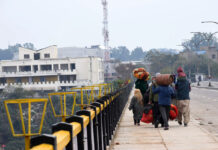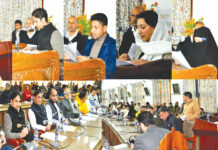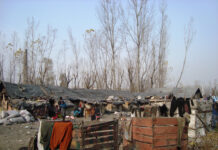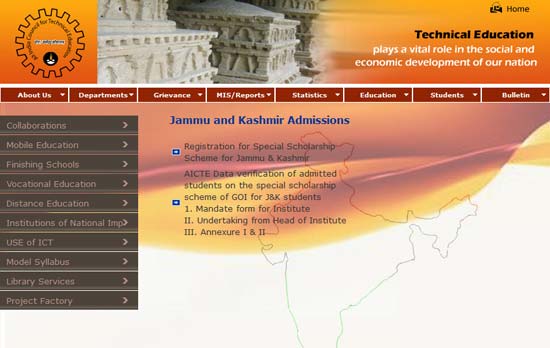Hamidullah Dar
The decision by J&K government to allow a convention to commemorate the 56th death anniversary of Syama Prasad Mookerjee – the founder president of Bharatiya Jan Sangh – is seen by as a political observers and analysts as adoption of a double standard.
The convention, jointly organized by Rashtriya Swayamsevak Sangh (RSS) and Bharatiya Janata Party (BJP) had caught the state government off guard. Authorities at Jammu University (JU) first allowed the convention to be organised at its General Zorawar Singh Auditorium, then announced that the venue shall be changed and later again changed their decision in favour of the organisers.
Political analysts say that government was dealing partially by allowing freedom of expression at one place and denying the same at other. Analysts maintain that the university platform was used for extending a decisive agenda.
“University is a particular space for secularism, humanism and plurality. Any party with a negative and divisive political agenda should not have been allowed to organize a convention in that space,” opines Dr Gull Mohammad Wani of Kashmir University’s Political Science department.
Dr Wani’s words are seconded by renowned Jammu based columnist Balraj Puri. “It was wrong to facilitate organization of RSS convention in Jammu University where everything said goes against the pluralistic nature of our state. And if this is not curbed at this stage, Jammu University will become a hub of activities that can prove disastrous to the integrity of the state,” says Puri.
Others believe that a perception about Jammu University becoming an easily approachable place for communal forces is growing. Analysts say that these forces use it to divulge their nefarious intentions.
“It is extremely unfortunate that JU is becoming a centre for fundamentalist forces,” veteran journalist and Patron of Kashmir Times, Ved Bhasin said. “Some among the students and staffers had objected to it (convention). But by and large, the student community and many staffers have communal tendencies here (JU).”
In fact, the former Head of Law department at JU now heads RSS J&K unit. The university has in the past too allowed conventions of “communal nature” within university premises. “Panun Kashmir, an organization of Kashmiri Pandits with communal agenda was allowed to organize an event at the same venue,” said Bhasin.
Reasons for opposing the convention in J&K surpass communal reasons. Syama Prasad Mookerjee – a Bengali communalist and founder of Bharatiya Jan Sangh – has had a bitter tussle with the Government of Jammu and Kashmir. The ideologue came to Jammu in 1953 without a permit – then a requirement given that J&K was an autonomous state. His slogan was “ek vidhan, ek pradhan, ek nishan (one constitution, one prime minister, one emblem)” aimed at severing the autonomy of the state.
While he was arrested and put in detention by Sheikh Mohammad Abdullah Government in Srinagar, he died in custody on June 23 1953. But his illegal visit is considered by many as the first step towards eroding the autonomy of the state.
His death was followed by anti-Muslim riots in Jammu besides certain parts in India.
“The present government headed by Sheikh Abdullah’s grandson Omar Abdullah allowed a convention about a person who rabidly pursued the agenda of trampling the autonomy of state. That too, in a university of which Omar is pro-chancellor,” says Javed Ahmad, a scholar at Kashmir University.
Analysts say that integration of the J&K with rest of India was pursued belligerently by Mookherjee and is still preached in doses by politicians and intellectuals, but in Kashmir.
“The spontaneity of two events at JU and KU (where vice president Hamid Ansari chaired a convocation and spoke of national integration) and their diametrically opposite stances is reflective of the Indian policy on Integration. It will generate a discussion Jammu has been representing politics of integration and assimilation since 1947 while Kashmir stresses regional identity,” says Dr Wani.
Peoples Democratic Party chief spokesman, Nayeem Akhter, terms the event as “lack of discretion by ruling party”.
“It is not a welcome sign and can pollute the political atmosphere in the state. RSS has a Kashmir and Muslim centric agenda and discretion must have been exercised while allowing RSS to organize a convention in a university. We have to be sensitive what is being expressed and promoted by organizations that have anti-Muslim agenda,” says Akhter.
However, Dr Sheikh Showkat Hussain, Associate Professor at Kashmir University’s Law department holds somewhat different view. “University must be allowed for every kind of debate and in this direction state should not be selective,” he says.
Dr Showkat, however, wants the government to allow same freedom in Kashmir University as well. “You cannot grant extreme freedom at Jammu University and impose extreme restriction in Kashmir University. All shades of opinions should be accommodated which can be a healthy sign. Otherwise, it is intellectual freedom at one place and fiefdom at other,” opines Dr Showkat.
The decision by J&K government to allow a convention to commemorate the 56th death anniversary of Syama Prasad Mookerjee – the founder president of Bharatiya Jan Sangh – is seen by as a political observers and analysts as adoption of a double standard.
The convention, jointly organized by Rashtriya Swayamsevak Sangh (RSS) and Bharatiya Janata Party (BJP) had caught the state government off guard. Authorities at Jammu University (JU) first allowed the convention to be organised at its General Zorawar Singh Auditorium, then announced that the venue shall be changed and later again changed their decision in favour of the organisers.
Political analysts say that government was dealing partially by allowing freedom of expression at one place and denying the same at other. Analysts maintain that the university platform was used for extending a decisive agenda.
“University is a particular space for secularism, humanism and plurality. Any party with a negative and divisive political agenda should not have been allowed to organize a convention in that space,” opines Dr Gull Mohammad Wani of Kashmir University’s Political Science department.
Dr Wani’s words are seconded by renowned Jammu based columnist Balraj Puri. “It was wrong to facilitate organization of RSS convention in Jammu University where everything said goes against the pluralistic nature of our state. And if this is not curbed at this stage, Jammu University will become a hub of activities that can prove disastrous to the integrity of the state,” says Puri.
Others believe that a perception about Jammu University becoming an easily approachable place for communal forces is growing. Analysts say that these forces use it to divulge their nefarious intentions.
“It is extremely unfortunate that JU is becoming a centre for fundamentalist forces,” veteran journalist and Patron of Kashmir Times, Ved Bhasin said. “Some among the students and staffers had objected to it (convention). But by and large, the student community and many staffers have communal tendencies here (JU).”
In fact, the former Head of Law department at JU now heads RSS J&K unit. The university has in the past too allowed conventions of “communal nature” within university premises. “Panun Kashmir, an organization of Kashmiri Pandits with communal agenda was allowed to organize an event at the same venue,” said Bhasin.
Reasons for opposing the convention in J&K surpass communal reasons. Syama Prasad Mookerjee – a Bengali communalist and founder of Bharatiya Jan Sangh – has had a bitter tussle with the Government of Jammu and Kashmir. The ideologue came to Jammu in 1953 without a permit – then a requirement given that J&K was an autonomous state. His slogan was “ek vidhan, ek pradhan, ek nishan (one constitution, one prime minister, one emblem)” aimed at severing the autonomy of the state.
While he was arrested and put in detention by Sheikh Mohammad Abdullah Government in Srinagar, he died in custody on June 23 1953. But his illegal visit is considered by many as the first step towards eroding the autonomy of the state.
His death was followed by anti-Muslim riots in Jammu besides certain parts in India.
“The present government headed by Sheikh Abdullah’s grandson Omar Abdullah allowed a convention about a person who rabidly pursued the agenda of trampling the autonomy of state. That too, in a university of which Omar is pro-chancellor,” says Javed Ahmad, a scholar at Kashmir University.
Analysts say that integration of the J&K with rest of India was pursued belligerently by Mookherjee and is still preached in doses by politicians and intellectuals, but in Kashmir.
“The spontaneity of two events at JU and KU (where vice president Hamid Ansari chaired a convocation and spoke of national integration) and their diametrically opposite stances is reflective of the Indian policy on Integration. It will generate a discussion Jammu has been representing politics of integration and assimilation since 1947 while Kashmir stresses regional identity,” says Dr Wani.
Peoples Democratic Party chief spokesman, Nayeem Akhter, terms the event as “lack of discretion by ruling party”.
“It is not a welcome sign and can pollute the political atmosphere in the state. RSS has a Kashmir and Muslim centric agenda and discretion must have been exercised while allowing RSS to organize a convention in a university. We have to be sensitive what is being expressed and promoted by organizations that have anti-Muslim agenda,” says Akhter.
However, Dr Sheikh Showkat Hussain, Associate Professor at Kashmir University’s Law department holds somewhat different view. “University must be allowed for every kind of debate and in this direction state should not be selective,” he says.
Dr Showkat, however, wants the government to allow same freedom in Kashmir University as well. “You cannot grant extreme freedom at Jammu University and impose extreme restriction in Kashmir University. All shades of opinions should be accommodated which can be a healthy sign. Otherwise, it is intellectual freedom at one place and fiefdom at other,” opines Dr Showkat.













